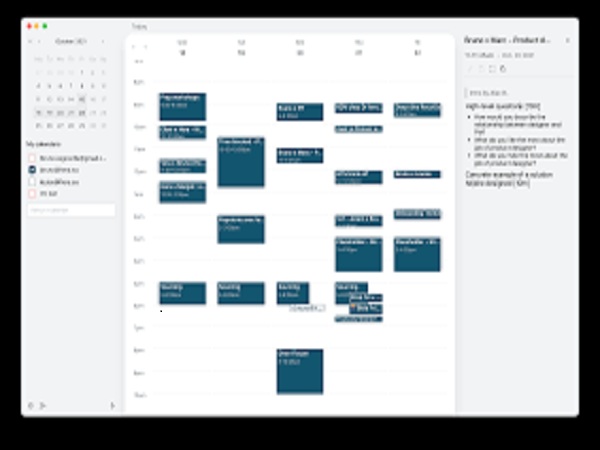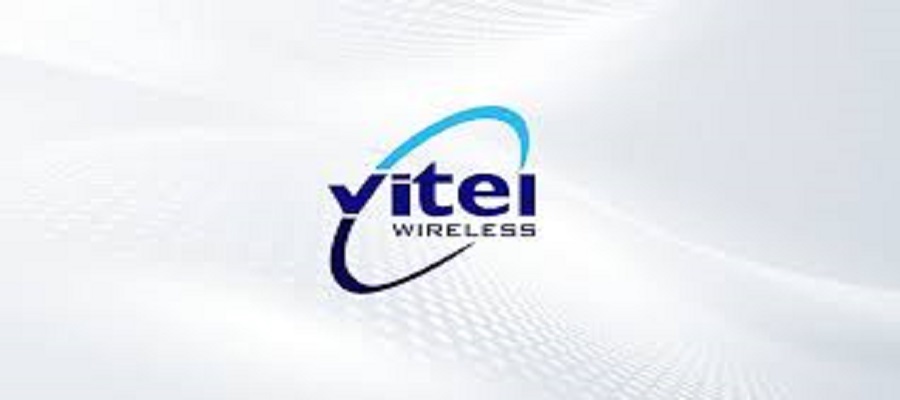General News
How Hera is Transforming Calendar into Main Work Interface

New calendar app, Hera, is transforming calendar into the main work interface for users.
In a pre-seed funding rou nd led by Eurazeo (which was under the Idinvest brand at the time) and a number of angel investors, Hera raised $465,000 (€400,000).
nd led by Eurazeo (which was under the Idinvest brand at the time) and a number of angel investors, Hera raised $465,000 (€400,000).
It further proceeded to join Y Combinator’s S21 batch and raised a $1.7 million seed round led by Eurazeo.
Thibaud Elzière, Alexis Bonillo, John Gabaix, Kyle Parrish, Karthik Puvvada, and Calvin French-Owen were among the business angels who invested in Hera, as well as investments from Kima Ventures and Notion Capital.
Hera started out as a calendar app with a focus on note-taking but has since improved its product offering after taking part in the Y Combinator program.
It now focuses on managing the whole process of an event for busy users with a lot of virtual meetings.
Hera helps users easily schedule meetings and share availabilities via email or any messaging app.
The startup is also going to build integrations with your other work tools so that you can surface important information before a meeting and extract information after a meeting.
What can Hera do?
Hera helps its users seamlessly schedule meetings while enabling users to select multiple slots. It also generates a friendly text about the next meeting which users can copy and paste on any platform.
That way, users don’t have to generate or click links to find out when the next scheduled meeting is.
Hera also allows users to take notes before meetings so that they don’t forget anything. Users can also add more notes and then export the data to their favorite note-taking apps.
Speaking on the platform’s Bruno Vegreville, CEO, Hera, said “We’re not going to become a project management platform, we’re going to integrate with tools that you already use.”
Hera has been in private beta for the past few months.
As part of its plans to add some multiplayer components to its platform, it will enable new features like allowing users directly mention other Hera users in their calendars and get feedback on a meeting, and better scheduling between users.
General News
AfDB, AfCFTA Unite to Unlock $3.4 Trillion Continental Market Through Strategic Infrastructure Development

The African Development Bank Group, the African Continental Free Trade Area (AfCFTA) Secretariat, and Africa50 have signed a Memorandum of Understanding to catalyse infrastructure development across the continent and unlock the full potential of the largest free trade area in the world since the establishment of the World Trade Organization.

Signed at the Africa50 General Shareholders Meeting in Maputo, the tripartite agreement establishes a comprehensive framework for cooperation in identifying, designing, constructing, and maintaining critical infrastructure projects that will enhance intra-African trade, accelerate regional integration, and drive digital transformation across the continent’s market of 1.3 billion people.
Currently, intra-African trade accounts for just 15–18% of total African trade, compared to 68% in Europe and 59% in Asia. The new partnership between the three institutions aims to dramatically increase this figure by addressing the infrastructure gaps that currently constrain trade flows across African borders.
It will prioritise developing multimodal transport corridors, cross-border infrastructure, logistics hubs, ports, and airports to seamlessly connect African markets and reduce the cost of doing business across borders.
Recognising the transformative power of the digital revolution, the partners will also work together to establish cutting-edge data centres and digital trade platforms, enabling African businesses to compete in the global digital economy.
“The African Development Bank has played a lead role in supporting the development and operation of regional economic corridors throughout the African continent by investing over $55 billion in the last nine years to develop road corridors, ports, railways, and expand power pools to interlink countries and boost trade,” said Solomon Quaynor, the Bank’s Vice President for Private Sector, Infrastructure & Industrialization.
Specifically, the Bank invested over $8 billion across 109 cross-border, economic corridors, and infrastructure projects between 2014 and 2024
He added: “The tripartite agreement between the AfCFTA Secretariat, the African Development Bank, and Africa50 underscores the paramount importance of realizing the full potential of the AfCFTA single market with its combined annual GDP of $3.4 trillion through the establishment of transport infrastructure.”
Alain Ebobissé, CEO of Africa50, emphasized that the agreement will support “the development and financing of trade-enabling infrastructure to boost intra-African trade, one of the continent’s greatest endeavours.”
The partnership will operate on six strategic pillars: ensuring alignment with the AfCFTA Agreement and regional policies; jointly identifying bankable projects; mobilising capital through innovative finance mechanisms; establishing robust tracking systems; encouraging stakeholder dialogue; and integrating environmental, social, and governance standards throughout project lifecycles.
The three-year memorandum of understanding will be operationalised through detailed joint work plans and specific implementation agreements that will define projects, timelines, and financing arrangements. Technical working groups will be established to ensure effective coordination among the partners and alignment with national and regional development priorities.
Speaking on a panel at the Africa50 event, Wamkele Mene, Secretary-General of the African Continental Free Trade Area, said: “In the global context, we are facing an unprecedented challenge in Africa.
“But this challenge is a unique opportunity for Africa; it is a wake-up call for us that we have to invest in our institutions, in infrastructure, and our skills. Infrastructure development is at the heart of trade and is a prerequisite to doubling intra-African trade to 25% by 2030.”
General News
Vitel Wireless, First MVNO Begins SIM Distribution

Vitel Wireless, Nigeria’s first Mobile Virtual Network Operator (MVNO) has entered into partnership with Slot Systems Limited for distribution of its SIM cards and other gadgets around the country.

Chudi Nwabueze, managing director, Vitel Wireless who described the partnership as a defining moment for his company said Vitel Wireles’s purpose is clear: to transform connectivity in Nigeria through innovation, affordability, and seamless access.
Nwabueze, who spoke in Lagos recently at the official engagement with Slot said Vitel Wireless, as the nation’s first Mobile Virtual Network Operator is committed to creating smart, reliable solutions that break down barriers to communication and make it easier and more cost-effective for people to stay connected anytime, anywhere.
“This partnership with SLOT is a meeting of shared values and vision. By combining our innovative mobile services with SLOT’s extensive retail presence, we are making Vitel Wireless SIM cards and the connectivity they offer more accessible than ever before. Customers will now be able to purchase, register, and top-up their SIM cards conveniently within their own communities.”
He described the collaboration as more than just distribution, ”it is about empowering people. It is about bridging the connectivity gap with technology, accessibility, and affordability at the heart of everything we do.”
Nwabueze further explained Vitel Wireless SIM card is a location technology awareness card. It can track whereabouts of a person. This information can help the police, on official demand, in case of unfortunate incident.
He said the disadvantages of tracking a person’s whereabout outweighs the advantages.
He explained that access code is given to another person for tracking.
“We operate as a core network and we have integrated with all the major networks in Nigeria, including international calls. So, on a simple language, we are a GSM company, that you do call, SMS, data and we offer more value like safety. And the good news is that we are spread out in the 36 States plus Abuja FCT in Nigeria.
General News
Digital Realty Nigeria Launches ServiceFabric Platform Today

Digital Realty Nigeria, a carrier-neutral data centre operator, will be launching its ServiceFabric® platform alongside opening of its new LKK2 Data Centre in Lagos today.

ServiceFabric Platform in Lagos Nigeria, aligned with Digital Realty’s commitment to enabling seamless global interconnectivity for businesses, providing enterprise customers in Nigeria with the ability to connect whenever, wherever, and to whoever they need to.
Engr. Ikechukwu Nnamani, managing director, Digital Realty Nigeria, said that the presence of ServiceFabric in Lagos will support the growing demand for hybrid IT and multi-cloud connectivity, empowering businesses with a secure, software-defined interconnection platform.
Located in the nearby coastal area of Lekki, LKK2 adds nearly 2MW of installed IT capacity across nearly 13,000 square feet of data hall space, supporting the growing demand for scalable, high-performance infrastructure across Nigeria and the broader region. LKK2 will be interconnected with Digital Realty’s existing LKK1 facility, which serves as the landing station for the 2Africa subsea cable, offering customers seamless access to the cable’s 46+ landing points in 33 countries across Africa, Europe, the Middle East, and Asia.
The integration of LKK2 with the 2Africa cable landing station at LKK1 enables businesses in West Africa to leverage low-latency connectivity and reliable access to global cloud and network services. This setup supports improved application performance and enhances access to international digital ecosystems through a carrier-neutral platform.
This new facility integrates with ServiceFabric®, Digital Realty’s global interconnection and orchestration platform, ensuring low-latency, high-throughput connectivity to local, regional, and international destinations. Through ServiceFabric®, LKK2 will interconnect with LOS1, the region’s top internet peering point, and LOS2, Digital Realty’s highly connected data centers located on Victoria Island in Lagos.
Together, this ecosystem delivers robust resilience, redundancy, speed, and scale for enterprise and hyperscale customers seeking to expand into a fast-growing digital market, ensuring continuous, reliable operations.
“LKK2 is a significant milestone in our journey to support digital transformation in Africa,” said Ike Nnamani, Managing Director, Digital Realty in Nigeria. “Our continued investment in Nigeria and the broader African region reinforces our commitment to enabling seamless global interconnectivity and providing a future-ready infrastructure platform for local and global enterprises.”
This strategic expansion reinforces Digital Realty’s commitment to advancing Africa’s digital transformation by delivering the infrastructure and connectivity needed to support innovation and growth across the continent. Recently ranked number one in Africa on Cloudscene’s Data Center Ecosystem Leaderboard, the company continues to cement its position as a leading enabler of the continent’s digital future. With the exponential growth of data and the acceleration of digital initiatives across the region, LKK2 provides the additional capacity which enterprises and content providers need to grow, scale, and connect – wherever and whenever they need to.
LKK2, due to become operational later this year, will support both local enterprises and multinational organizations seeking reliable, secure, and interconnected infrastructure in Africa.

 E-Business3 days ago
E-Business3 days agoTimely, Effective Threat Intelligence is a Priority for IT Professionals

 Telecom3 days ago
Telecom3 days agoT2mobile Unwraps Nigeria’s First eKYC SIM-Registration Web App

 General News3 days ago
General News3 days agoAfDB, AfCFTA Unite to Unlock $3.4 Trillion Continental Market Through Strategic Infrastructure Development

 E-Business3 days ago
E-Business3 days agoNIMC Upgrades Digital ID Issuance Platform for Nigerians Abroad
- Telecom3 days ago
MTN Nigeria to Restore Services to 15 LGAs, 3 States

 Telecom3 days ago
Telecom3 days agoKONGA103.7FM Spotlights SMEs With Unmatched Media Reach

 Broadcasting3 days ago
Broadcasting3 days agoLASAA reaffirms commitment to fairness, safety and industry growth

 E-Financial24 hours ago
E-Financial24 hours agoFBNQuest Merchant Bank Facilitates Landmark ₦5Bn Commercial Paper Programme for Accion Microfinance Bank


























